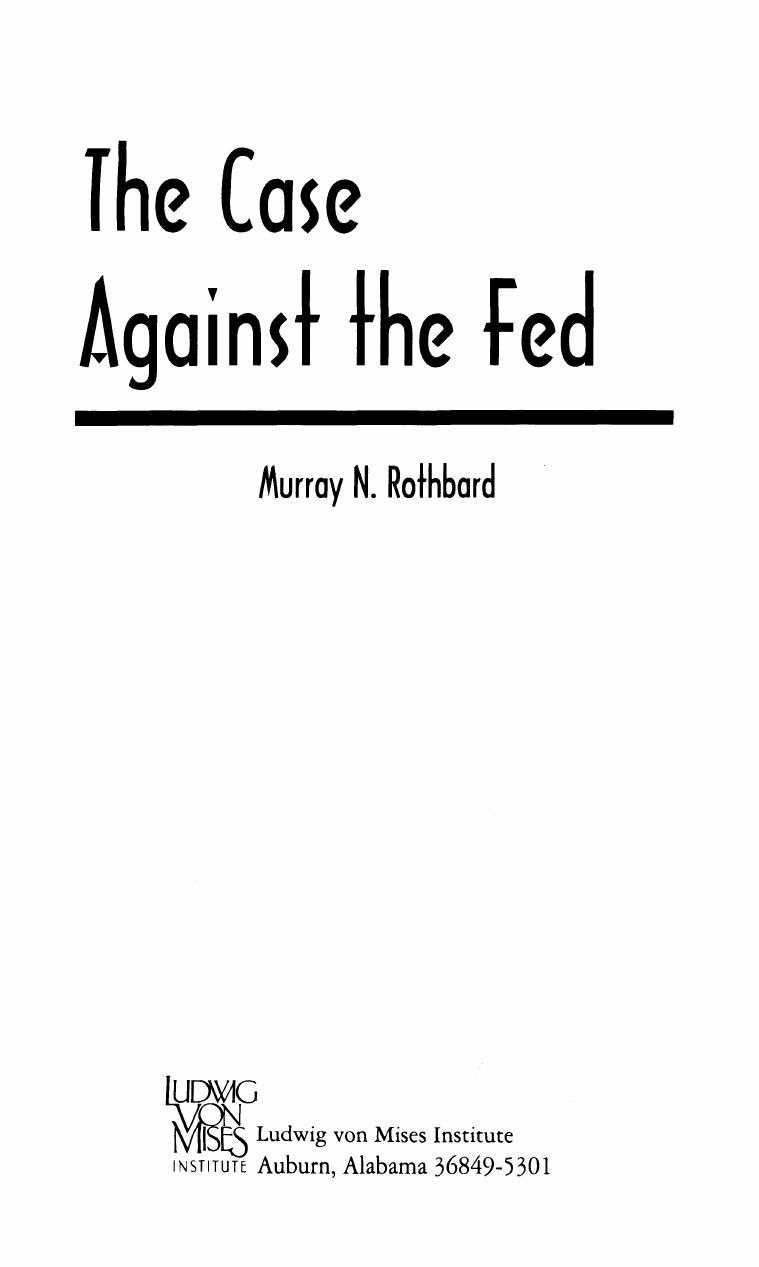The Case Against the Fed by Murray N. Rothbard

Author:Murray N. Rothbard [Rothbard, Murray N.]
Language: eng
Format: epub, pdf
Publisher: Ludwig von Mises Institute
Putting a Central Bank Across:
Manipulating a Movement, 1897–1902
Around 1900, two mighty financial-industrial groups, each consisting of investment banks, commercial banks, and industrial resources, confronted each other, usually with hostility, in the financial, and more importantly, the political arena. These coalitions were (1) the interests grouped around the Morgan bank; and (2) an alliance of Rockefeller–Harriman and Kuhn, Loeb interests. It became far easier for these financial elites to influence and control politicians and political affairs after 1900 than before. For the “Third Party System,” which had existed in America from 1856 to 1896, was comprised of political parties, each of which was highly ideological and in intense conflict with the opposing party. While each political party, in this case the Democratic, the Republican, and various minor parties, consisted of a coalition of interests and forces, each was dominated by a firm ideology to which it was strongly committed. As a result, citizens often felt lifelong party loyalties, were socialized into a party when growing up, were educated in party principles, and then rode herd on any party candidates who waffled or betrayed the cause. For various reasons, the Democratic and Republican parties after 1900, in the Fourth and later Party Systems, were largely non-ideological, differed very little from each other, and as a result commanded little party loyalty. In particular, the Democratic Party no longer existed, after the Bryan takeover of 1896, as a committed laissez-faire, hard-money party. From then on, both parties rapidly became Progressive and moderately statist.20
Since the importance of political parties dwindled after 1900, and ideological laissez-faire restraints on government intervention were gravely weakened, the power of financiers in government increased markedly. Furthermore, Congress—the arena of political parties—became less important. A power vacuum developed for the intellectuals and technocratic experts to fill the executive bureaucracy, and to run and plan national economic life relatively unchecked.
The House of Morgan had begun, in the 1860s and 70s, as an investment bank financing and controlling railroads, and then, in later decades, moved into manufacturing and commercial banking. In the opposing coalition, the Rockefellers had begun in oil and moved into commercial banking; Harriman had earned his spurs as a brilliant railroad investor and entrepreneur in competition with the Morgans; and Kuhn, Loeb began in investment banking financing manufacturing. From the 1890s until World War II, much of American political history, of programs and conflicts, can be interpreted not so much as “Democrat” versus “Republican,” but as the interaction or conflict between the Morgans and their allies on the one hand, and the Rockefeller–Harriman-Kuhn, Loeb alliance on the other.
Thus, Grover Cleveland spent his working life allied with the Morgans, and his cabinet and policies were heavily Morgan-oriented; William McKinley, on the other hand, a Republican from Rockefeller's home state of Ohio, was completely in the Rockefeller camp. In contrast, McKinley's vice-president, who suddenly assumed the presidency when McKinley was assassinated, was Theodore Roosevelt, whose entire life was spent in the Morgan ambit. When Roosevelt suddenly trotted out the Sherman Antitrust Act,
Download
The Case Against the Fed by Murray N. Rothbard.pdf
This site does not store any files on its server. We only index and link to content provided by other sites. Please contact the content providers to delete copyright contents if any and email us, we'll remove relevant links or contents immediately.
The Secret History by Donna Tartt(19023)
The Social Justice Warrior Handbook by Lisa De Pasquale(12182)
Thirteen Reasons Why by Jay Asher(8882)
This Is How You Lose Her by Junot Diaz(6869)
Weapons of Math Destruction by Cathy O'Neil(6260)
Zero to One by Peter Thiel(5782)
Beartown by Fredrik Backman(5729)
The Myth of the Strong Leader by Archie Brown(5491)
The Fire Next Time by James Baldwin(5421)
How Democracies Die by Steven Levitsky & Daniel Ziblatt(5209)
Promise Me, Dad by Joe Biden(5139)
Stone's Rules by Roger Stone(5078)
A Higher Loyalty: Truth, Lies, and Leadership by James Comey(4945)
100 Deadly Skills by Clint Emerson(4910)
Rise and Kill First by Ronen Bergman(4772)
Secrecy World by Jake Bernstein(4736)
The David Icke Guide to the Global Conspiracy (and how to end it) by David Icke(4696)
The Farm by Tom Rob Smith(4500)
The Doomsday Machine by Daniel Ellsberg(4480)
